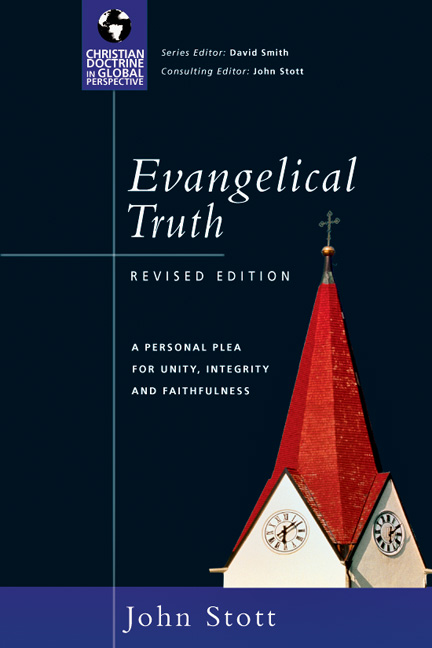John Stott: Evangelical Truth

Cover from the 2005 revised edition.
John Stott, Evangelical Truth: A Personal Plea for Unity, Integrity & Faithfulness (Downer’s Grove, IL: InterVarsity Press, 1999), 131 pages.
In this 1999 book, John Stott has summarized with excellence that which all evangelicals hold in common. He begins by defining who the evangelicals are and then applies the three R’s—revelation, redemption, and regeneration—to succinctly explain the breadth of evangelical faith.
As part of his definitions, Stott distinguishes between fundamentalism and evangelicalism. In describing the many “tribes” of evangelicalism, he unapologetically includes Pentecostals and charismatics in his list of the different, but sometimes overlapping groups. Rightfully so, for the essentials he defines as evangelical belief are certainly embraced by Pentecostal/charismatics.
Stott relates revelation to the Father, redemption to the Son, and regeneration to the Spirit, thereby bearing “witness to the supreme authority of the Word of God, the atoning efficacy of the cross of Christ and the indispensable ministries of the Holy Spirit” (p. 122).
This threefold introduction to evangelical theology could not be sufficiently summarized here, so allow me to make some brief comments. First, Stott makes a distinction between revelation and illumination that many Pentecostal/charismatics do not feel necessary (see the section entitled “personal revelation” beginning on page 43).
For anyone needing a refresher on the grace of God and reminder of what Messiah accomplished on the tree of Golgotha, Stott’s summary of the redemption story may well begin the flood. I believe that sound teaching on this subject is deeply necessary to bring balance to those who have over emphasized holiness in the life of the believer. Such over emphasis has led to good actions being equated with righteousness, thereby turning the “good news” into a man-centered endeavor. When we rightly understand what Jesus has finished, we are able to enter that rest instead of practically striving to earn it.
There are many things to be said about Stott’s presentation of the Spirit and His ministry. While he takes issue with the pneumatology of the late John Wimber, he is friendlier to general Pentecostal/charismatic pneumatology—perhaps he does not know how similar these two are. Stott does seem unaware of how classical Pentecostals and charismatics frame the doctrine of the subsequence of Spirit-baptism. Overall, he is fair and reasonable, calling for biblical balance and a reminder of the Spirit’s primary work—regeneration.
Stott closes by echoing Paul’s fivefold summons given to the church at Philippi. Stott calls for holiness of living in “evangelical integrity” (p. 113), “evangelical stability” anchored in God’s Word (p. 115), contending for “evangelical truth,” “evangelical unity,” and “evangelical endurance.”
One potential weakness I see is that Stott’s Anglicanism seems to have flavored his outlook on evangelicalism as a whole. This flavor might be quite foreign to others, such as the classical Pentecostal or Baptist. I hope that this becomes a strength by opening readers from other traditions to see things in a different perspective and expand their palette.
Category: Biblical Studies, Summer 2001


